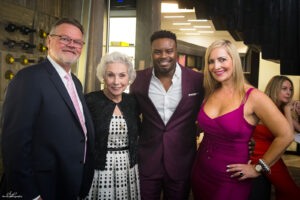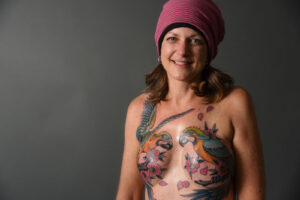It was May 2010 and Melissa Mullamphy was living her best life. She was 39 and had been recently promoted to a management position at work; she was married to her highschool sweetheart, and they were in love with their 10-month old “miracle baby.” But then came a call from her mother.
Over the phone, her mother told Mullamphy she was in a lot of pain and her stomach was significantly swollen. Mullamphy and her sister convinced their mother to go to the emergency room, where what they hoped would be a treatable bowel obstruction turned out to be stage IIIC ovarian cancer.
From the moment of diagnosis, Mullamphy never left her mother’s side. She made it her full-time job to make sure she was provided the best care. Unfortunately, she was witness to inept doctors and nurses making the sort of careless mistakes you might only see in horror movies. “When I say mistakes, I don’t mean simple mistakes, like a nurse forgetting to turn on an IV,” Mullamphy says. “But life-altering mistakes, such as misdiagnosis, lack of communication, reading CT scans wrong and chemotherapy poisoning.”
Mullamphy’s mother had always been averse to doctors, and visited one only a handful of times in the past 40 years, but she knew she wasn’t getting the type of care and attention she deserved. One evening, Mullamphy’s mom was admitted to the hospital after her sister noticed her mother’s labored breathing. Her oncologist thought she seemed fine, but he agreed to admit her.
Turns out, she was suffering from bilateral pulmonary embolisms and deep vein thrombosis — the furthest thing from fine. That night, Mullamphy promised her mother she would do whatever she could to make sure the world knew and understood how the healthcare industry had betrayed her. Mullamphy wanted to believe her mother would survive this devastating disease, but less than seven months later, a few weeks shy of her 69th birthday, her mother succumbed to her illness.
Mullamphy was heartbroken and struggled to process her death. But she remembered her promise to her mother, that her death would not be in vain, so she got to work on writing a book. She had documented every aspect of her mom’s treatment in detailed spreadsheets. Reviewing the copious notes and reports forced her to relive some of the worst days of her life.
“Sometimes it was therapeutic,” Mullamphy says, “And at other times, it left me angry and added to my grief.”She started writing the book in 2011, the year after her mother died, but it wasn’t until December 2021 that it was ready for publication. Throughout the decade, she cycled through different versions of the book. At its fourth iteration, she felt it was ready to be useful to readers. “Every chapter of “Not in Vain, A Promise Kept” represents the months my mom went through, from diagnosis to death.” Mullamphy says. “Each chapter ends with what I learned, what I would do differently and what the reader needs to do to advocate for themselves and their loved ones.”
Her book shines light on a particular event that terrified her — when she realized her mother was essentially being poisoned by her medication. Upon visiting their mother at the hospital, her sister could tell she was not doing well and texted Mullamphy at work. Mullamphy researched the drugs her mother was receiving, and when she got to the hospital, she knew her mother was suffering from toxicity. The oncologist said there was nothing to worry about, and shrugged it off, already one foot out the door to enjoy the weekend. He came back three days later and confirmed Mullamphy’s suspicions — her mother was toxic. To be clear, Mullamphy isn’t suggesting the loved one always knows better than the doctor, but asserts that “a little research when the stakes are high is important.”
 Building upon the positive response to her book, Mullamphy is excited to continue her role as a patient advocate. “I will never stop sharing my mom’s and my family’s experiences to help others,” Mullamphy says. She hopes the book can serve as a guide for all healthcare professionals on how to improve patient experiences. “I’m not the first one to lose a loved one to cancer,” Mullamphy says. “And will not be the last, but there is so much to be learned and changed in healthcare, and time is not on our side.”
Building upon the positive response to her book, Mullamphy is excited to continue her role as a patient advocate. “I will never stop sharing my mom’s and my family’s experiences to help others,” Mullamphy says. She hopes the book can serve as a guide for all healthcare professionals on how to improve patient experiences. “I’m not the first one to lose a loved one to cancer,” Mullamphy says. “And will not be the last, but there is so much to be learned and changed in healthcare, and time is not on our side.”







